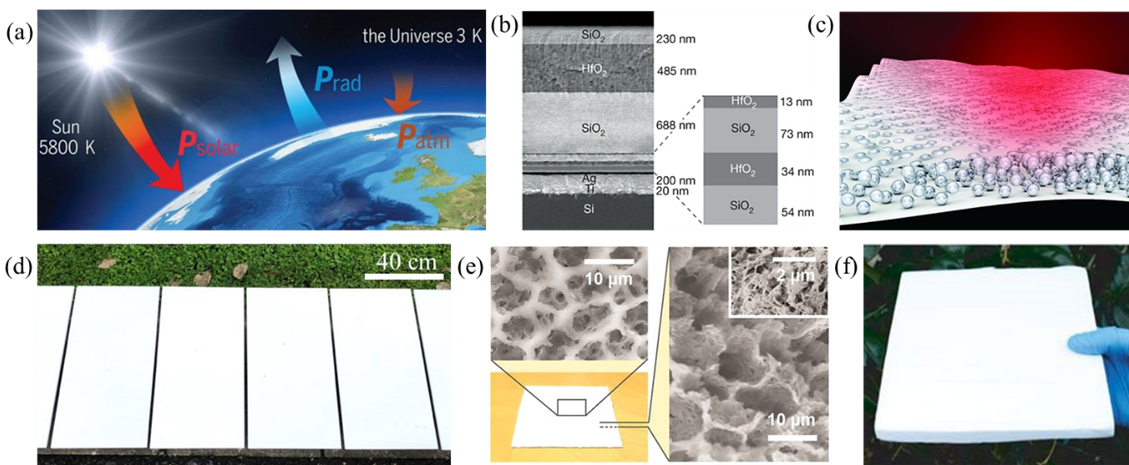Development and progress of radiative cooling materials
DOI:
https://doi.org/10.18686/cest.v2i1.144Abstract
Since the industrial era, the extensive use of fossil energy has led to a continuous increase in greenhouse gas emissions, thereby accelerating global warming. Cooling energy consumption represents a significant portion of total energy usage, accounting for approximately 20% of global energy consumption. Therefore, there is an urgent necessity to develop new cooling technologies that are low-energy consumption, highly efficient, and environmentally friendly to meet the growing demand for cooling.

Downloads
Published
How to Cite
Issue
Section
License
Copyright (c) 2024 Cheng Jin, Gang Pei, Bin Zhao

This work is licensed under a Creative Commons Attribution 4.0 International License.
References
1. Wu C. Rapid rising in radiative forcing. Clean Energy Science and Technology. 2024; 2(1). doi: 10.18686/cest.v2i1.110 DOI: https://doi.org/10.18686/cest.v2i1.110
2. Yin X, Yang R, Tan G, et al. Terrestrial radiative cooling: Using the cold universe as a renewable and sustainable energy source. Science. 2020; 370(6518): 786-791. doi: 10.1126/science.abb0971 DOI: https://doi.org/10.1126/science.abb0971
3. Zhao B, Hu M, Ao X, et al. Radiative cooling: A review of fundamentals, materials, applications, and prospects. Applied Energy. 2019; 236: 489-513. doi: 10.1016/j.apenergy.2018.12.018 DOI: https://doi.org/10.1016/j.apenergy.2018.12.018
4. Cui Y, Luo X, Zhang F, et al. Progress of passive daytime radiative cooling technologies towards commercial applications. Particuology. 2022; 67: 57-67. doi: 10.1016/j.partic.2021.10.004 DOI: https://doi.org/10.1016/j.partic.2021.10.004
5. Orel B, Gunde MK, Krainer A. Radiative cooling efficiency of white pigmented paints. Solar Energy 1993; 50: 477-482. doi: 10.1016/0038-092X(93)90108-Z DOI: https://doi.org/10.1016/0038-092X(93)90108-Z
6. Baranov DG, Xiao Y, Nechepurenko IA, et al. Nanophotonic engineering of far-field thermal emitters. Nature Materials. 2019; 18(9): 920-930. doi: 10.1038/s41563-019-0363-y DOI: https://doi.org/10.1038/s41563-019-0363-y
7. Zhang J, Shi K, Lu L, et al. Experiments on near-field radiative heat transfer: A review. Clean Energy Science and Technology. 2023; 1(1). doi: 10.18686/cest.v1i1.45 DOI: https://doi.org/10.18686/cest.v1i1.45
8. Raman AP, Anoma MA, Zhu L, et al. Passive radiative cooling below ambient air temperature under direct sunlight. Nature. 2014; 515(7528): 540-544. doi: 10.1038/nature13883 DOI: https://doi.org/10.1038/nature13883
9. Zhai Y, Ma Y, David SN, et al. Scalable-manufactured randomized glass-polymer hybrid metamaterial for daytime radiative cooling. Science. 2017; 355(6329): 1062-1066. doi: 10.1126/science.aai7899 DOI: https://doi.org/10.1126/science.aai7899
10. Song J, Zhang W, Sun Z, et al. Durable radiative cooling against environmental aging. Nature Communications. 2022; 13(1). doi: 10.1038/s41467-022-32409-7 DOI: https://doi.org/10.1038/s41467-022-32409-7
11. Mandal J, Fu Y, Overvig AC, et al. Hierarchically porous polymer coatings for highly efficient passive daytime radiative cooling. Science. 2018; 362(6412): 315-319. doi: 10.1126/science.aat9513 DOI: https://doi.org/10.1126/science.aat9513
12. Li T, Zhai Y, He S, et al. A radiative cooling structural material. Science. 2019; 364(6442): 760-763. doi: 10.1126/science.aau9101 DOI: https://doi.org/10.1126/science.aau9101
13. Yang W, Zhang E, Zhao J, et al. Dawn of clean energy: Enhanced heat transfer, radiative cooling, and firecracker-style controlled nuclear fusion power generation system. Clean Energy Science and Technology. 2023; 1(1). doi: 10.18686/cest.v1i1.61 DOI: https://doi.org/10.18686/cest.v1i1.61
14. Meng X, Chen Z, Qian C, et al. Durable and mechanically robust superhydrophobic radiative cooling coating. Chemical Engineering Journal. 2023; 478: 147341. doi: 10.1016/j.cej.2023.147341 DOI: https://doi.org/10.1016/j.cej.2023.147341
15. Chen Y, Mandal J, Li W, et al. Colored and paintable bilayer coatings with high solar-infrared reflectance for efficient cooling. Science Advances. 2020; 6(17). doi: 10.1126/sciadv.aaz5413 DOI: https://doi.org/10.1126/sciadv.aaz5413
16. Li W, Shi Y, Chen Z, et al. Photonic thermal management of coloured objects. Nature Communications. 2018; 9(1). doi: 10.1038/s41467-018-06535-0 DOI: https://doi.org/10.1038/s41467-018-06535-0
17. Lin K, Chen S, Zeng Y, et al. Hierarchically structured passive radiative cooling ceramic with high solar reflectivity. Science. 2023; 382(6671): 691-697. doi: 10.1126/science.adi4725 DOI: https://doi.org/10.1126/science.adi4725
18. Zhao X, Li T, Xie H, et al. A solution-processed radiative cooling glass. Science. 2023; 382(6671): 684-691. doi: 10.1126/science.adi2224 DOI: https://doi.org/10.1126/science.adi2224
19. Zhao D, Tang H. Staying stably cool in the sunlight. Science. 2023; 382(6671): 644-645. doi: 10.1126/science.adk9614 DOI: https://doi.org/10.1126/science.adk9614




.jpg)
.jpg)

